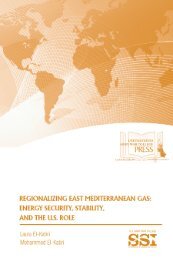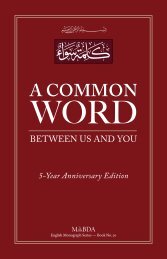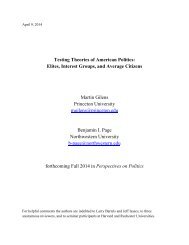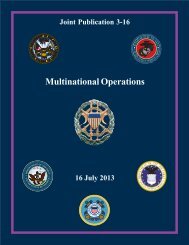ABUSE OF STRUCTURED FINANCIAL PRODUCTS- Misusing Basket Options to Avoid Taxes and Leverage Limits MAJORITY AND MINORITY STAFF REPORT
ABUSE OF STRUCTURED FINANCIAL PRODUCTS- Misusing Basket Options to Avoid Taxes and Leverage Limits MAJORITY AND MINORITY STAFF REPORT
ABUSE OF STRUCTURED FINANCIAL PRODUCTS- Misusing Basket Options to Avoid Taxes and Leverage Limits MAJORITY AND MINORITY STAFF REPORT
Create successful ePaper yourself
Turn your PDF publications into a flip-book with our unique Google optimized e-Paper software.
23<br />
over form doctrine is that the tax results of an arrangement are better determined based on the<br />
underlying substance rather than an evaluation of the mere formal steps by which the<br />
arrangement was undertaken.” 80<br />
The substance over form judicial doctrine permits the IRS <strong>to</strong> re-characterize a transaction<br />
according <strong>to</strong> its actual substance. 81 According <strong>to</strong> a leading tax expert, “<strong>to</strong> permit the true nature<br />
of a transaction <strong>to</strong> be disguised by mere formalisms which exist solely <strong>to</strong> alter tax liabilities<br />
would seriously impair the effective administration of the tax policies of Congress.” 82 Under<br />
rulings of the Supreme Court, the substance over form doctrine allows the IRS <strong>and</strong> the courts <strong>to</strong><br />
look holistically at a transaction <strong>to</strong> underst<strong>and</strong> its nature <strong>and</strong> bypass any titles or formalities used<br />
<strong>to</strong> disguise the transaction for tax purposes. 83 For example, the IRS may apply the substance<br />
over form doctrine in analyzing whether a derivative, such as an option, should more properly be<br />
analyzed as a direct investment in the underlying or referenced assets through the use of “a<br />
disguised agency arrangement” with a counterparty, since the derivative can be used <strong>to</strong> achieve<br />
economic returns indistinguishable from the direct investment in the underlying physical<br />
security. 84<br />
Step Transaction Doctrine. The step transaction doctrine is a corollary of the substance<br />
over form doctrine. It treats a series of separate transactions as a single transaction if the<br />
separate transactions were, in substance, steps that were intended <strong>to</strong> be “integrated” <strong>and</strong><br />
“focused” <strong>to</strong>ward a result <strong>to</strong> avoid taxation. 85 According <strong>to</strong> the Joint Committee on Taxation:<br />
“In determining whether <strong>to</strong> invoke the step transaction doctrine, the courts have looked <strong>to</strong> two<br />
primary fac<strong>to</strong>rs: (1) the intent of the taxpayer, <strong>and</strong> (2) the temporal proximity of the separate<br />
steps.” 86 Courts have held that the doctrine should not apply if the taxpayer can show that at the<br />
time the first of a series of steps was undertaken, the taxpayer did not intend <strong>to</strong> affect the other<br />
steps. 87 Courts have also held that the step transaction doctrine may apply even if a taxpayer can<br />
identify a valid business purpose. As one appeals court stated: “‘[A] legitimate business goal<br />
does not grant [a] taxpayer carte blanche <strong>to</strong> subvert Congressionally m<strong>and</strong>ated tax patterns.’” 88<br />
80 Id. at 18.<br />
81 Id. at 19.<br />
82 J. Bruce Donaldson, “When Substance-over-Form Argument is Available <strong>to</strong> the Taxpayer,” 48 Marq. L. Rev. 41,<br />
41 (1964).<br />
83 See Comm’r of Internal Revenue v. Court Holding Co., 324 U.S. 331, 334 (1945).<br />
84 3/4/2008 “Present Law <strong>and</strong> Analysis Relating <strong>to</strong> the Tax Treatment of Derivatives,” prepared by the Joint<br />
Committee on Taxation, JCX-21-08, at 13-14, https://www.jct.gov/publications.html?func=startdown&id=1319.<br />
85 11/10/1999 “Description <strong>and</strong> Analysis of Present-Law Tax Rules <strong>and</strong> Recent Proposals Relating <strong>to</strong> Corporate Tax<br />
Shelters,” prepared by the Joint Committee on Taxation, JCX-84-99, at 19-20,<br />
https://www.jct.gov/publications.html?func=showdown&id=2846 (citing Penrod v. Comm’r, 88 T.C. 1415, 1428<br />
(1987)).<br />
86 Id. at 20.<br />
87 Id. (citing McDonalds Restaurants of Ill. v. Comm’r, 688 F.2d 520 (7th Cir. 1982)).<br />
88 AeroQuip-Vickers, Inc. v. Comm’r, 347 F.3d 173 (6 th Cir. 2003) (citing Associated Wholesale Grocers, Inc. v.<br />
U.S., 927 F.2d 1517, 1526 (10 th Cir. 1991) <strong>and</strong> quoting Kuper v. Comm’r, 533 F.2d 152, 158 (5 th Cir. 1976)). See<br />
also Jacobs Eng’g Grp., Inc. v. U.S., No. CV 96-2662, 1997 WL 314167 (C.D. Cal. Mar. 5, 1997) (aff’d, without<br />
public opinion, No. 97-55647, 1999 WL 89057 (9th Cir. 1999) (ruling against the taxpayer, the court found that<br />
twelve short-term loans from CFC really functioned as a long-term loan lasting over two years)).







